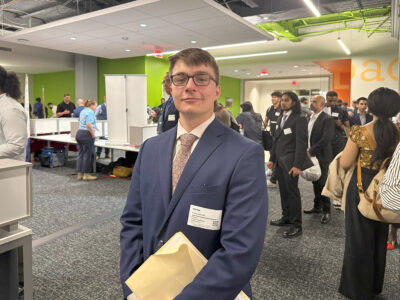In their spare time, Jaron Rhodes and Harry Vartanian attempt to predict the future.
They try to answer the question: What’s the next big thing in tech? What’s an invention that will capture the attention of giants like Apple, Google or Microsoft?
It’s their side hustle.
The pair, friends since their undergrad days at Penn, make up HJ Laboratories, a company that develops, applies for and sells patents. They hit it big last year, when they sold a patent for a flexible device display to Apple, according to AppleInsider. Rhodes and Vartanian said they could not comment on patent acquisitions.

Jaron Rhodes. (Courtesy photo)
They have 30 patents that have either been approved or are currently pending, they said. (The patent application process takes about two to three years.)
Rhodes, 35, and Vartanian, 34, are something of an anomaly in the entrepreneurship world for two reasons.
For one, they work solely in the realm of ideas — for now, at least. They leave the manufacturing and the commercialization to the companies that buy their patents.
“We’re committed to seeing our ideas go to market but what we’re capable of doing now is this, with our time and resources,” Rhodes said in an interview.
That’s the other thing that makes HJ Labs unique: both cofounders have full-time jobs outside of HJ Labs — Rhodes works in communications for Penn and Vartanian researches and writes patents at a local law firm — and they’re not looking to quit them anytime soon.
In fact, their day jobs have actually helped their work with HJ, they said. Their jobs offer them stable income, runway and the freedom to pivot and change their business model. It also allows them to be more imaginative.
“If we were working on this full time, we wouldn’t have been able to be as creative,” said Rhodes, who spent nearly a decade working in marketing for state-backed investment firm Ben Franklin Technology Partners before he joined Penn.

Harry Vartanian. (Courtesy photo)
The pair does lots of research — Rhodes says he skims 100 articles a day — and constantly bounce ideas off each other via email. They try to catch on to patterns and figure out what direction technology is heading. Since the patent process takes a few years, they’re focused on developing patents for technology that would be novel five years down the road. That’s the whole “predicting the future” part.
The other unknown is who might want to buy your patent.
“You really don’t know who’s looking for what at the time and for what reason,” Vartanian said, calling the tech patent world a “dark market.”
“No one wants to reveal what their next move is going to be,” he said.
HJ declined to disclose how many patents they had sold.
Their next big thing is indoor GPS — a way to triangulate someone’s location when they’re within a building.
“Every major company is in the market for this,” Vartanian said.
Before you go...
Please consider supporting Technical.ly to keep our independent journalism strong. Unlike most business-focused media outlets, we don’t have a paywall. Instead, we count on your personal and organizational support.
3 ways to support our work:- Contribute to the Journalism Fund. Charitable giving ensures our information remains free and accessible for residents to discover workforce programs and entrepreneurship pathways. This includes philanthropic grants and individual tax-deductible donations from readers like you.
- Use our Preferred Partners. Our directory of vetted providers offers high-quality recommendations for services our readers need, and each referral supports our journalism.
- Use our services. If you need entrepreneurs and tech leaders to buy your services, are seeking technologists to hire or want more professionals to know about your ecosystem, Technical.ly has the biggest and most engaged audience in the mid-Atlantic. We help companies tell their stories and answer big questions to meet and serve our community.
Join our growing Slack community
Join 5,000 tech professionals and entrepreneurs in our community Slack today!






